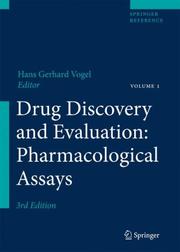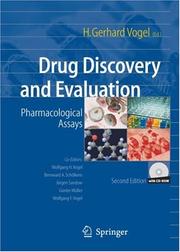| Listing 1 - 9 of 9 |
Sort by
|

ISBN: 3540709959 3540714200 3540714197 Year: 2008 Publisher: Berlin, Germany : Springer,
Abstract | Keywords | Export | Availability | Bookmark
 Loading...
Loading...Choose an application
- Reference Manager
- EndNote
- RefWorks (Direct export to RefWorks)
The rapid progress in biology will continue to change the methodological approach to drug discovery in the coming years. Electronic media will continuously help researchers to access and share information. It is, however, becoming more and more evident that many young pharmacologists have only limited training in classical pharmacological methodologies. These long-standing and still highly relevant methods are simply not available in the electronic databases. Drug Discovery and Evaluation:Pharmacological Assays bridges this gap by comprehensively covering the pharmacological methods that have been utilized successfully for more than a hundred years as well as the latest technologies. The classical methods and the newest technologies, all in one book! The 3rd edition of this successful reference book contains an updated selection of the most frequently used assays for reliably detecting the pharmacological effects of potential drugs. Effects covered include cardiovascular, analgesic, endocrine, psychotropic, respiratory, renal, and immunomodulatory activities. Each of the more than 1000 assays comprises a detailed protocol outlining the purpose and rationale of the method, a critical assessment of the results and their pharmacological and clinical relevance. In addition, animal models of rare diseases are described. For this third edition, all existing chapters have been revised and completely updated. A large number of assays were added: we are now publishing two volumes. Sections that have been specifically enlarged include - Pharmacological assays in thrombosis and haemostasis (formerly called activity of blood constituents), - Antidiabetic activity (includes completely new chapters such as Biochemical Methods in Diabetology), - Anti-atherosclerotic activity. Audience: Pharmacologists and Pharmacists in Academia and Industry.
Pharmacology, Experimental. --- Drugs --- Design. --- Testing. --- Clinical drug trials --- Clinical trials of drugs --- Drug bioscreening --- Drug trials --- Clinical pharmacology --- Drug development --- Drug design --- Pharmaceutical design --- Experimental pharmacology --- Therapeutics, Experimental --- Clinical trials --- Effectiveness --- Testing --- Evaluation --- Toxicology. --- Pharmacy. --- Biochemistry. --- Pharmacology/Toxicology. --- Biochemistry, general. --- Biological chemistry --- Chemical composition of organisms --- Organisms --- Physiological chemistry --- Biology --- Chemistry --- Medical sciences --- Medicine --- Materia medica --- Pharmacology --- Chemicals --- Poisoning --- Poisons --- Composition --- Toxicology --- Medicine. --- Health Workforce --- Pharmacology. --- Drug effects --- Medical pharmacology --- Chemotherapy --- Pharmacy --- Physiological effect --- Methodology.

ISBN: 3540423966 Year: 2002 Publisher: Berlin ; New York : Springer,
Abstract | Keywords | Export | Availability | Bookmark
 Loading...
Loading...Choose an application
- Reference Manager
- EndNote
- RefWorks (Direct export to RefWorks)
Pharmacology, Experimental. --- Drugs --- Pharmacologie expérimentale --- Médicaments --- Design. --- Testing. --- Conception --- Essais cliniques
Book
Abstract | Keywords | Export | Availability | Bookmark
 Loading...
Loading...Choose an application
- Reference Manager
- EndNote
- RefWorks (Direct export to RefWorks)

ISBN: 3540602917 3662033356 366203333X Year: 1997 Publisher: Berlin Springer
Abstract | Keywords | Export | Availability | Bookmark
 Loading...
Loading...Choose an application
- Reference Manager
- EndNote
- RefWorks (Direct export to RefWorks)
This reference book contains a comprehensive selection of the most frequently used assays for reliably detecting pharmacological effects of potential drugs, including tests for cardiovascular, analgesic, psychotropic, metabolic, endocrine, respiratory, renal, and immunomodulatory activities. Each of the over 700 assays comprises a detailed protocol with the purpose and rationale of the method, a description of the experimental procedure, a critical assessment of the results and their pharmacological and clinical relevance, and pertinent references. Identification of specific tests is facilitated by the enclosed CD-ROM which allows for a quick and full text research. An appendix with guidelines and legal regulations for animal experiments in various countries will help to plan these experiments properly in accordance with the welfare of laboratory animals.
Biopharmaco-efficiency. Pharmacokinetics --- Pharmacosynthesis. Pharmacochemistry --- Drug Design --- Drug Screening --- Pharmacology, Experimental --- Pharmacologie expérimentale --- Pharmacologie expérimentale --- Drug Design. --- Drug Evaluation. --- Drug Evaluation, Preclinical. --- Pharmacology. --- Pharmacy. --- Biochemistry. --- Pharmacology/Toxicology. --- Biochemistry, general. --- Drug effects --- Medical pharmacology --- Medical sciences --- Chemicals --- Chemotherapy --- Drugs --- Pharmacy --- Biological chemistry --- Chemical composition of organisms --- Organisms --- Physiological chemistry --- Biology --- Chemistry --- Medicine --- Materia medica --- Pharmacology --- Physiological effect --- Composition --- Testing. --- Clinical drug trials --- Clinical trials of drugs --- Drug bioscreening --- Drug trials --- Clinical pharmacology --- Drug development --- Clinical trials --- Effectiveness --- Testing --- Evaluation --- Drug evaluation --- Drug screening

ISBN: 3540256385 9783540256380 3540298045 3540334424 Year: 2006 Publisher: Berlin, Heidelberg : Springer Berlin Heidelberg : Imprint: Springer,
Abstract | Keywords | Export | Availability | Bookmark
 Loading...
Loading...Choose an application
- Reference Manager
- EndNote
- RefWorks (Direct export to RefWorks)
Biopharmaco-efficiency. Pharmacokinetics --- Pharmacosynthesis. Pharmacochemistry --- Pharmacology, Experimental --- Drugs --- Pharmacologie expérimentale --- Médicaments --- Design --- Testing --- Conception --- Essais cliniques --- Drug development. --- Drugs -- Research. --- Drugs -- Safety measures. --- Electronic books. -- local. --- Pharmacokinetics. --- Chemistry, Pharmaceutical --- Pharmacokinetics --- Drug Design --- Drug Evaluation, Preclinical --- Drug Discovery --- Chemistry --- Metabolic Phenomena --- Pharmacology --- Evaluation Studies as Topic --- Pharmacological Phenomena --- Kinetics --- Physiological Phenomena --- Investigative Techniques --- Biochemical Phenomena --- Natural Science Disciplines --- Phenomena and Processes --- Biological Science Disciplines --- Analytical, Diagnostic and Therapeutic Techniques and Equipment --- Chemical Phenomena --- Disciplines and Occupations --- Pharmacy, Therapeutics, & Pharmacology --- Health & Biological Sciences --- Research. --- Safety measures. --- Pharmacologie expérimentale --- Médicaments --- EPUB-LIV-FT LIVBIOMO LIVMEDEC SPRINGER-B --- Drug kinetics --- Kinetics, Drugs --- Medicaments --- Medications --- Medicine (Drugs) --- Medicines (Drugs) --- Pharmaceuticals --- Prescription drugs --- Pharmaceutical research --- Development of drugs --- New drug development --- Research --- Development --- Medicine. --- Pharmacology. --- Biomedicine. --- Pharmacology/Toxicology. --- Chemical kinetics --- Bioactive compounds --- Medical supplies --- Pharmacopoeias --- Chemotherapy --- Materia medica --- Pharmacy --- Metabolism --- Toxicology. --- Chemicals --- Medicine --- Poisoning --- Poisons --- Toxicology --- Drug effects --- Medical pharmacology --- Medical sciences --- Physiological effect --- Pharmacology, Experimental. --- Experimental pharmacology --- Therapeutics, Experimental
Book
ISBN: 3642252397 3642252400 3642252419 Year: 2013 Publisher: Berlin, Heidelberg : Springer Berlin Heidelberg : Imprint: Springer,
Abstract | Keywords | Export | Availability | Bookmark
 Loading...
Loading...Choose an application
- Reference Manager
- EndNote
- RefWorks (Direct export to RefWorks)
Safety aspects have become an outstanding issue in the process of drug discovery and development. Until 15 years ago safety aspects were addressed by pharmacological testing of the selected compound in high doses in tests directed at indications other than the intended indication of the new compound. These tests were followed by pharmacokinetic studies, which were mainly aimed at confirming of a suitable half-life time and at oral activity. Safety aspects relied mostly on toxicity studies, which however gave information on changes of organ structure rather than on organ function. Toxicological and pharmacokinetic studies were adapted to the progress of studies in clinical pharmacology and clinical trails. But the success rate in the pharmaceutical industry and the introduction of new chemical entities to the market per year dropped dramatically, whereas the development time for a new compound increased, sometimes exceeding the patent protection. A change of strategy was therefore adopted, involving the following changes: - Parallel instead of sequential involvement of the various disciplines (multidimensional compound optimization). - The term "Safety Pharmacology" was coined. The International Conference on Harmonization (ICH) founded a Safety Pharmacology Working Group. Easily accessible and the most informative tests now have to be selected. - Exposure of a drug to the body by pharmacokinetic studies on absorption, distribution, metabolism and excretion has to be investigated at an early stage of development and can contribute to the selection of a compound for development. Toxicology experienced major achievements by the introduction of new methods, e.g., in silico methods, toxicogenomics and toxicoproteomics. The book is a landmark in the continuously changing world of drugs. As such it is important reading for many groups: not only for all students of pharmacology and toxicology but also for physicians, especially those involved in clinical trials of drugs, and for pharmacists who have to know the safety requirements of drugs. The book is absolutely essential for scientists and managers in the pharmaceutical industry who are involved in drug finding, drug development and decision making in the development process. In particular, the book will be of use for government institutions and committees working on official guidelines for drug evaluation worldwide.
Medicine. --- Toxicology. --- Biomedicine. --- Pharmacology/Toxicology. --- Health & Biological Sciences --- Pharmacy, Therapeutics, & Pharmacology --- Chemicals --- Clinical sciences --- Medical profession --- Toxicology --- Pharmacology. --- Medicine --- Pharmacology --- Poisoning --- Poisons --- Drug effects --- Medical pharmacology --- Medical sciences --- Chemotherapy --- Drugs --- Pharmacy --- Physiological effect
Digital
ISBN: 9783540298045 Year: 2006
Abstract | Keywords | Export | Availability | Bookmark
 Loading...
Loading...Choose an application
- Reference Manager
- EndNote
- RefWorks (Direct export to RefWorks)
Digital
ISBN: 9783642252402 Year: 2013 Publisher: Berlin, Heidelberg Springer
Abstract | Keywords | Export | Availability | Bookmark
 Loading...
Loading...Choose an application
- Reference Manager
- EndNote
- RefWorks (Direct export to RefWorks)
Safety aspects have become an outstanding issue in the process of drug discovery and development. Until 15 years ago safety aspects were addressed by pharmacological testing of the selected compound in high doses in tests directed at indications other than the intended indication of the new compound. These tests were followed by pharmacokinetic studies, which were mainly aimed at confirming of a suitable half-life time and at oral activity. Safety aspects relied mostly on toxicity studies, which however gave information on changes of organ structure rather than on organ function. Toxicological and pharmacokinetic studies were adapted to the progress of studies in clinical pharmacology and clinical trails. But the success rate in the pharmaceutical industry and the introduction of new chemical entities to the market per year dropped dramatically, whereas the development time for a new compound increased, sometimes exceeding the patent protection. A change of strategy was therefore adopted, involving the following changes: - Parallel instead of sequential involvement of the various disciplines (multidimensional compound optimization). - The term "Safety Pharmacology" was coined. The International Conference on Harmonization (ICH) founded a Safety Pharmacology Working Group. Easily accessible and the most informative tests now have to be selected. - Exposure of a drug to the body by pharmacokinetic studies on absorption, distribution, metabolism and excretion has to be investigated at an early stage of development and can contribute to the selection of a compound for development. Toxicology experienced major achievements by the introduction of new methods, e.g., in silico methods, toxicogenomics and toxicoproteomics. The book is a landmark in the continuously changing world of drugs. As such it is important reading for many groups: not only for all students of pharmacology and toxicology but also for physicians, especially those involved in clinical trials of drugs, and for pharmacists who have to know the safety requirements of drugs. The book is absolutely essential for scientists and managers in the pharmaceutical industry who are involved in drug finding, drug development and decision making in the development process. In particular, the book will be of use for government institutions and committees working on official guidelines for drug evaluation worldwide.
Toxicology --- Pharmacology. Therapy --- Pathological biochemistry --- Human medicine --- klinische chemie --- medische biochemie --- farmacologie --- biochemie --- biomedische wetenschappen --- multimedia --- toxicologie
Book
ISBN: 9783540298045 Year: 2006 Publisher: Berlin Heidelberg Springer Berlin Heidelberg
Abstract | Keywords | Export | Availability | Bookmark
 Loading...
Loading...Choose an application
- Reference Manager
- EndNote
- RefWorks (Direct export to RefWorks)
| Listing 1 - 9 of 9 |
Sort by
|

 Search
Search Feedback
Feedback About UniCat
About UniCat  Help
Help News
News